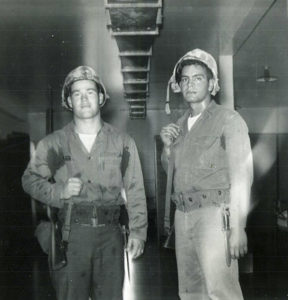Dick Portillo

An American Success Story
By Larry Atseff
Dick Portillo has met a lot of famous people during his 80 years. One he never met is Frank Sinatra. Frank’s gone, but one of his most memorable songs is “MY WAY”. Opening lyrics include these words:
“My friend, I’ll make it clear
I’ll state my case of which I am certain
I’ve lived a life that’s full
I traveled each and every highway
And more, much more
I did it, I did it my way
Regrets, I’ve had a few
But then again, too few to mention
I did what I had to do
And saw it through without exemption
I planned each charted course
Each careful step along the byway
And more, much, much more
I did it, I did it my way
Yes, there were times,
I’m sure you knew
When I bit off more than I could chew
And through it all, whenever there was doubt
I ate it up and spit it out
I faced it all and I stood tall
And did it, did it my way
I’ve loved, laughed and cried
I had my fill, my share of losing
And now, as tears subside
I find that it’s all so amusing
And to think I did all that
And may I say not in a shy way
No, no, not me I did it my way
For what is a man, what has he got
If not himself, then he has naught
Not to say the things that he truly feels
And not the words of someone who kneels
The record shows I took all the blows”
And did it my way” Source: LyricFind Songwriters: Claude Francois / Gilles Thibaut / Jacques Revaux / Paul Anka My Way lyrics © Warner Chappell Music France, Jeune Musique Editions, BMG Rights Management, Suisa, Concord Music Publishing LLC, CONSALAD CO., Ltd
Those words sum up Dick Portillo and how he has succeeded beyond his most ambitious dreams. When you read his book, “Out of the Dog House”, or talk to him in person about his success, like we did, you will find out that he not only has lived the American Dream, he tells you how he did it, from an $1100 investment in a hot dog stand in 1963 to selling his business in 2014 which left him a very wealthy man. It is an easy, entertaining, stream-of-consciousness read, just like he was sitting there with you, just talking, and giving you specific, very personal, real-life history. It is full of practical examples of how hard work, seeing obvious needs and filling them better than the other guy, will always be a great recipe for success. In the end, it is an entrepreneur’s handbook. Chapter headings, in this order, take you on your way. Dick uses the first chapter, “Humble Beginnings”, as an appetizer. It is an overview of his life, from being the son of poor, immigrant parents to where he is today. His father had Mexican, Spanish and French heritage and immigrated from Mexico.
“From the time a customer hits the front door, and senses the aromas and the hustle, to the time they leave, after enjoying a quality meal and fast service at a reasonable price, I want them to feel ‘The Portillo’s Experience”

A young Dick Portillo, on the right, when he was in the 1st Marine division, with a fellow Marine
His mother came from Greece. It sets the stage…and you want to read more to know how it happened. Next, “Family Struggles” details how he spent a lot of his youth in Chicago Public Housing; how he fondly remembers his sister and brother. He remembers the scrimping and saving. He remembers how his father taught him discipline with spankings and how he learned to take responsibility for your actions, but this was nothing compared to the next chapter: “Life in the Marines”. It was there that he saw how when you are focused and you train and train, a bunch of rag tag guys can become a single powerful unit. As he puts it, “I learned the value of training, organization and teamwork.” “Moving Back to Chicago” tells what life was like, after the Marines, to come back to Chicago and marry his high-school sweetheart, Sharon, and the many part-time jobs he was taking, trying to find his way. “A Mother-in-Law’s Approval”, tells how his mother-in-law convinced her daughter Sharon to let Dick spend $1100 on a trailer for a hot dog stand, instead of saving for a house. “Time to Expand”, details how, when and why he made the decision to add more restaurants. He tells the valuable lesson of not making a move until you are ready. The “Building an Organization” chapter tells how he carefully added widely popular items (he personally loved) to the menu over several years, and combined them with constant training so that quality in food, service, speed and efficiency could be profitable. And, very important, it would be extremely difficult for competition to copy. “That training to handle a complex menu was like a moat around my castle, to keep competition out.” “Sacrifice” makes the point that you have to give up some things to succeed, and there is no way around it. The “What I Learned from Failure” chapter details what we all have heard: how failure can be a great teacher and that Dick has been no exception.

The original hotdog stand “The Dog House”
In the chapter “The Roaring ‘80s and ‘90s”, Dick recalls the good times in Chicago with the Bears winning the Super Bowl and Michael Jordan and the Bulls. He said it was an exciting time for Portillo’s too, because he successfully expanded. As his number of restaurants grew, he saw that he could scale up the number and maintain the quality he and his employees had worked so hard to perfect. The chapter on “California Dreaming” is the story of his first restaurant outside of Chicago. It took him out of his comfort zone… but he knew it could be successful. That’s because his booming business of shipping Portillo’s all over the country to Chicagoans who had moved away showed him that his biggest sales were in zip code 90620, Buena Park, California. Another case of seeing the obvious and making the most of it. “The Importance of Competition” chapter points out that you should never underestimate the competition and that if you are smart, you can also learn from them. “Hello, Arizona”, the chapter on his smashing opening in Scottsdale, was further proof that Portillo’s could be a national brand. “The Pillars of Success” puts the focus on “Quality”, “Service”, “Attitude”, and “Cleanliness” which are the bedrocks of Portillo’s training.
This chapter describes how his son has helped instill those principles throughout the company, and how important it is to hire people who believe in those principles. It is executing that training constantly that sets Portillo’s apart and creates what Dick calls “The Portillo’s Experience”. “From the time a customer hits the front door, and senses the aromas and the hustle, to the time they leave, after enjoying a quality meal and fast service at a reasonable price, I want them to feel ‘The Portillo’s Experience’”. “Gift or Curse?” describes how his combination of great instincts with people, and a willingness to get out of his comfort zone, have been both a gift and a curse. He explains how he dealt with attention deficit syndrome by just being determined enough to overcome it, by using his skills of observation, paying attention to detail, and coming up with better solutions to everyday problems. “Only in America” is a look back at the accomplishments and the people who helped him, and who; in turn, helped themselves become more successful, personally and professionally.

He describes the pros and cons of selling and the decision to choose Berkshire Partners, in “The Decision to Sell” in August 2014. “Moving Forward” covers his life since the sale, and how he enjoys the fruits of his labor. He stays active in managing his own portfolio of real estate holdings. All in all, Dick is content. After all, he has accomplished a great deal. He has an enormous legacy in terms of a restaurant chain that prides itself on “The Portillo’s Experience”, that millions enjoy. He is also proud of the number of employees who have worked with him to create the experience. There is one other legacy he would like to leave. In honor of Sharon, who has been the love of his life and a pillar of strength for 62 years, but who is suffering from Type 1 Diabetes, he will continue to support the work of Dr. Jose Oberholzer, a distinguished doctor, who is coming ever closer to a cure that will help Sharon and 1.6 million others who have been diagnosed with Type 1 Diabetes. (See the article with the Doctor Jose “Type 1 Diabetes” on what he is accomplishing.)
*Photos provided by Dick Portillo and Marcello Rodarte
